Jimmie Guymon – Original Trail Blazer
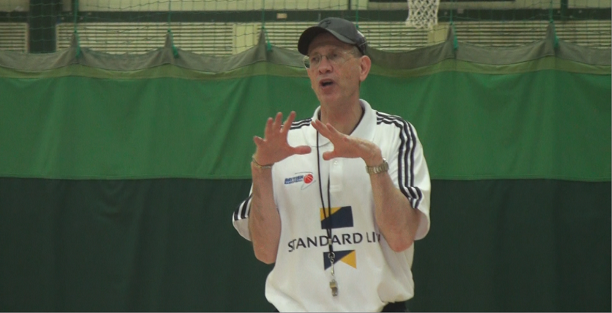
By Luke Hatfield | @Luke_Hatfield
The first time Jimmie Guymon touched a basketball was when he was just four years of age. What transpired from there was a story that led him to being one of the first US imports to play in the UK, and has culminated in him being recognised as one of the top player development coaches in the UK.
Guymon, who’s now 64, is perhaps most well known for his work with a skinny 17 year old big kid named Joel Freeland, who grew to be one of the premier big men in Europe and is now suiting up in a Portland Trailblazers jersey and Will Neighbour, who’s based in Arkansas with UALR and is tipped to have a bright professional career ahead of him.
Both Freeland and Neighbour attribute a lot of their success to Guymon, but where did his story begin?
“When I was four years old me and my older brother would always play one on one in the yard,” he recalled over a phone conversation.
“He was 10 years older than me so he’d normally spot me 18 points and we’d play to 20. He was obviously a lot bigger than me, that’s how I developed my variety of shots because it was always hard to get something conventional off. As I got older we used to reduce the amount of points I would start with and I think I finally beat him square up when I was 15.”
Growing up in New Mexico, Guymon began his playing career when he was 12 years old with his junior high school team, moving on to Valley High School. He quickly developed an effective, but unorthodox, shooting stroke and despite not seeing a lot of minutes in his sophomore year when his team won the state championship, he says it was this experience that taught him how to win by being a team of unselfish individuals and just how much hard work, graft and determination it took to become a champion.
The 6’2″ guard took success with him wherever he went, it seemed, going on to Eastern New Mexico University where he won an NAIA National Championship as a sophomore. His winning track record didn’t go unnoticed as he was drafted in the fifth round of the NBA draft by the Cincinnati Royals (now the Sacramento Kings), and the ninth round by the Dallas Chaparrals in the old ABA draft.
Luck was not on Guymon’s side early in his career, as he was struck down with infectious hepatitis.
“It took me over a year to recover from that fully. After that I tried out with the Phoenix Suns but I got cut, that’s when I made the decision to head to Europe to play for Crystal Palace,” said Guymon, who went on to average 28 points and 8 rebounds per game with Crystal Palace. Whilst in south London he set the standard for young basketball players to aspire to. He had the skills and dedication to the sport that surpassed anything that had been seen there before.
With his incredible work ethic, it was no surprise success shortly followed. After securing a starting spot with the London team he won three championships and led the team to the quarter finals of the European Cup Winners’ Cup; still the only English team to do so.
“After being named National Champions at Eastern New Mexico, reaching the quarter finals of the European Cup Winners’ Cup was probably my next biggest achievement in basketball. Especially so as we beat the eventual winners on their home court earlier in the competition, I think that was the first time an English team ever beat an Italian team on their home court actually,” he reminisced.
It was during his time at Crystal Palace that the veteran Guymon really began to fall in love with helping other players work on their skills, often working out with the programme’s junior teams.
“Former coach Roy Packham was running the junior team back then, I was eager to play as much as I could so I just asked him if I could come down and play. I just tried to help them develop and help Roy with the junior players. From then on I always enjoyed working with individual players.”
“He was a revelation to the club when he came over,” said Packham, who clearly still holds Guymon in extremely high regards. “I have NEVER seen a guy work so hard, take the game so seriously and be a real student of the game. He was a role model for everybody at the club.
“For me, he was, and still is as far as I am concerned, the best American to have played over here. Not just because of his offensive and defensive skills, but he did so much more. He is one of very very few Americans who have put, not just a little, but an awful lot in to helping basketball in this country.”
Guymon’s playing career finished with Solent Stars, but before deciding to focus on one on one teaching of the game, he tried his hand at coaching.
“I got pretty disenchanted with coaching pretty quickly in English basketball. Looking back I maybe should have worked in Europe for a while but I didn’t want to travel around too much, so I took my first coaching job at the Brighton Bears team, but they had trouble with sponsorship and I had my salary cut there, after that I worked with Kingston but the same thing happened. Finally I coached at Crystal Palace but they lost all their sponsorship and folded, that’s when I made the decision to get out of coaching.”
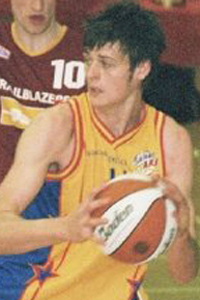
“Joel was pretty raw when I first met him, he was a terrific athlete, could jump well and just defined natural ability. He was easy to develop as he could see something and pretty much pick it up straight away, he’s a real see and emulate kind of guy.
“I first met him at Solent, but it was my wife who saw him first at a camp in Crystal Palace, he was with his dad and she asked him if he would speak to me about Joel.”
Freeland went on to an extremely successful professional career in Europe, and despite getting drafted by the Portland Trailblazers in the 2006 draft, only joined them this season – a transition that has proved difficult.
The 6’10” big man, who also represents GB, has appeared in just 35 of Portland’s 62 games so far, averaging 2.3 points and 2.2 rebounds in less than 10 minutes per game. Joel and Guymon remain in touch with via email.
“I got a bit concerned when he first got into the NBA and struggled a bit so I sent him some emails telling him to keep his head up. He’s quite capable but in the NBA you’re playing the very best the world has to offer and it’s very hard to break in for a rookie. If he gets into the right situation with the right coach he could become a star.”
The 1990 born Will Neighbour is Guymon’s more recent project.
“Will always took a little longer to pick things up,” he said in his American accent that remains ever present.
“He’s not quite the see and emulate guy Joel is, but he’s got great ball handling skills he picked up when he was shorter so he’s ahead of Joel in that respect…he has had a couple shoulder injuries which has kept him off the weights, but if he gets healthy and gets a bit bigger he could make the NBA, he has that kind of ability.”
Speaking to Neighbour, he is extremely complimentary of Jimmie and what he has achieved with him.
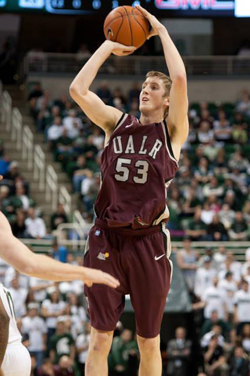
“I would travel on two trains and a bus to have a session with Jimmie no matter what, if anyone gets a chance to work with him they should take it, he’s just the best coach I’ve ever worked with.”
That kind of respect is what you will hear from anyone who’s ever worked with Guymon, and it is this recognition that has earned him an almost legend-like status across the UK.
Former manager Terry Doherty echoes these sentiments.
“His intensity and search for perfection were a revelation to many in a part time semi professional sport and his exploits on court were remarkable with hitherto unseen moves and exceptional skills. He provided a bench mark in terms of skill and dedication which certainly Crystal Palace, and probably many other players and coaches used as a basis for individual and team development for many years.
“He has clearly been a major influence on many young players and thus the sport throughout his career. There have been many outstanding players and coaches here since Jimmie arrived but few if any have been as influential, because few have combined the talent to influence with the intensity, desire and understanding of what is required to be the best you can be at whatever you choose to do – not just basketball.”
Jimmie is not the only Guymon to have his name thrown around in basketball conversations; his son Matt, at one point considered one of the top prospects in the country, coaches the Solent junior team after a college career in the States and his wife, Bev, is a regional basketball development manager.
“Bev’s really dedicated to basketball; the amount of time she puts in is unbelievable, she just pours herself into the sport. She’s dedicated to helping develop younger players and her effort is just unreal. And Matt is just a natural coach he’s good with people and has great knowledge, plus he’s a two-time national champion so he knows how to win,” he said proudly.
It’s clear that basketball isn’t just a sport within the Guymon family, and Jimmie truly feels that it has a much bigger potential here in the UK than it is given credit for.
“The talent here in the UK is unmatched across Europe, you won’t find a more concentrated force in the whole of Europe as you will in London. You’ll find players here who are just waiting for an opportunity to be developed, that are why it’s so disheartening to see that basketball has had its funding cut here.
“I was really shocked at the news [of the funding cuts] it’s clear that they are pouring money into individual sports and misunderstand the talent which exists in basketball here. It’s a crime that basketball isn’t getting the funding it should, it really is.”
Though he spent time working with British Basketball (see some footage from 2010 we pulled from the archives above!), as an assistant to the GB U20s for two European Championships, he was inexplicably let go, a decision that shocked many. Despite this, he still just wants to see basketball improve.
Guymon has put in requests to British Basketball to try and develop more talent in the UK, including development plans to try and sway them into giving him a chance to build a national team which could challenge the top European teams on a consistent level, but his cries seem to have fallen on deaf ears.
“Just let me try and develop two players a year, just to see what happens. But they have never had the money to let me do that. I’m a development guy, I’ve told them, I’ll travel to wherever the kid is, I’ll even sleep in my car just to work with these hugely talented players but it’s never happened and I don’t think it will ever happen.”
With GB’s funding secured only for a year, and strict performance criteria to meet if it is to be continued beyond 2013, we may be seeing the beginning of the end of a British basketball movement which had only just got started.
“The wealth of talent here is huge, and that should be rewarded instead of rejected.”
Perhaps if there were more like Jimmie Guymon, the future of British basketball would be secure.


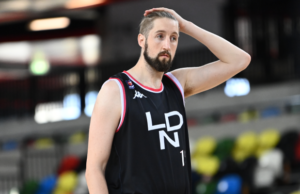
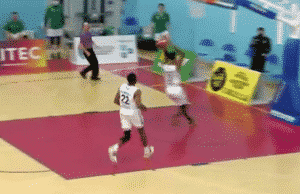


1 Comment